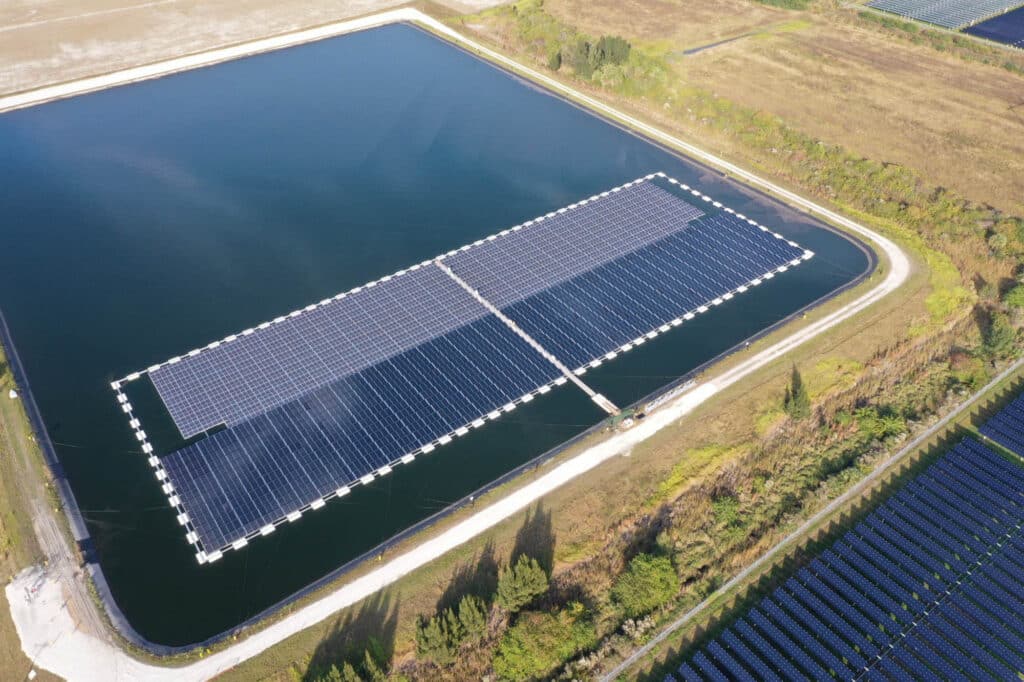Floating solar is a relatively new technology that has the potential to revolutionize energy generation. These panels are installed on water bodies, such as reservoirs, lakes, and ponds. They offer several advantages over traditional solar panels, including:
- They don’t require land space. This is a major advantage in countries with limited land resources. For example, China has a rapidly growing population and a limited amount of land. Floating solar panels could help to meet China’s growing energy needs without taking up valuable land.
- They can utilize unused water space. This is a way to generate renewable energy from water bodies that are not currently being used. For example, many reservoirs are used for hydroelectric power generation. Floating solar panels could be installed on these reservoirs to generate additional electricity.
- They can generate more electricity. The water underneath the panels helps to cool them, which can lead to increased efficiency. This is because solar panels work best at cooler temperatures.
- They can reduce evaporation. This is a benefit for water bodies that are used for drinking water or irrigation. Evaporation can lead to water loss, which can be a problem in areas with limited water resources. Floating solar panels can help to reduce evaporation by shading the water’s surface.
- They are good for large electricity sources. Floating solar systems can be installed in large arrays, which provide a significant amount of electricity, making them well-suited for meeting the needs of large power grids. Large companies, municipalities, government facilities, engineering firms, and more can benefit from floating solar panels.
There are a few challenges that need to be addressed before floating solar panels can become more widespread. These challenges include:
- The cost of floating solar panel projects is still relatively high. However, the cost is expected to come down as the technology matures.
- Floating solar can potentially impact water quality. However, AccuSolar mitigates this concern by using non-toxic materials. Regularly cleaning your panels and platforms also helps to prevent water contamination.
- Floating solar panels are exposed to the elements, so they need to be designed to withstand strong winds and storms. At AccuSolar, we’re constantly evolving our design and installation methods to ensure forces are accounted for.
Despite these challenges, the future of floating solar panels is promising. As the technology matures and the cost comes down, floating solar panels are expected to become more widespread. They have the potential to provide a significant source of renewable energy, especially in countries with large water bodies.
Conclusion
Floating solar is a promising new technology that has the potential to revolutionize energy generation. They offer many advantages over traditional solar panels, and they are becoming more cost-effective and widespread. As technology develops, floating solar will likely play an increasingly important role in the global energy mix. To learn more contact us today!Floating solar is a relatively new technology that has the potential to revolutionize energy generation. These panels are installed on water bodies, such as reservoirs, lakes, and ponds. They offer several advantages over traditional solar panels, including:
- They don’t require land space. This is a major advantage in countries with limited land resources. For example, China has a rapidly growing population and a limited amount of land. Floating solar panels could help to meet China’s growing energy needs without taking up valuable land.
- They can utilize unused water space. This is a way to generate renewable energy from water bodies that are not currently being used. For example, many reservoirs are used for hydroelectric power generation. Floating solar panels could be installed on these reservoirs to generate additional electricity.
- They can generate more electricity. The water underneath the panels helps to cool them, which can lead to increased efficiency. This is because solar panels work best at cooler temperatures.
- They can reduce evaporation. This is a benefit for water bodies that are used for drinking water or irrigation. Evaporation can lead to water loss, which can be a problem in areas with limited water resources. Floating solar panels can help to reduce evaporation by shading the water’s surface.
- They are good for large electricity sources. Floating solar systems can be installed in large arrays, which provide a significant amount of electricity, making them well-suited for meeting the needs of large power grids. Large companies, municipalities, government facilities, engineering firms, and more can benefit from floating solar panels.
There are a few challenges that need to be addressed before floating solar panels can become more widespread. These challenges include:
- The cost of floating solar panel projects is still relatively high. However, the cost is expected to come down as the technology matures.
- Floating solar can potentially impact water quality. However, AccuSolar mitigates this concern by using non-toxic materials. Regularly cleaning your panels and platforms also helps to prevent water contamination.
- Floating solar panels are exposed to the elements, so they need to be designed to withstand strong winds and storms. At AccuSolar, we’re constantly evolving our design and installation methods to ensure forces are accounted for.
Despite these challenges, the future of floating solar panels is promising. As the technology matures and the cost comes down, floating solar panels are expected to become more widespread. They have the potential to provide a significant source of renewable energy, especially in countries with large water bodies.
Conclusion
Floating solar is a promising new technology that has the potential to revolutionize energy generation. They offer many advantages over traditional solar panels, and they are becoming more cost-effective and widespread. As technology develops, floating solar will likely play an increasingly important role in the global energy mix. To learn more contact us today!





